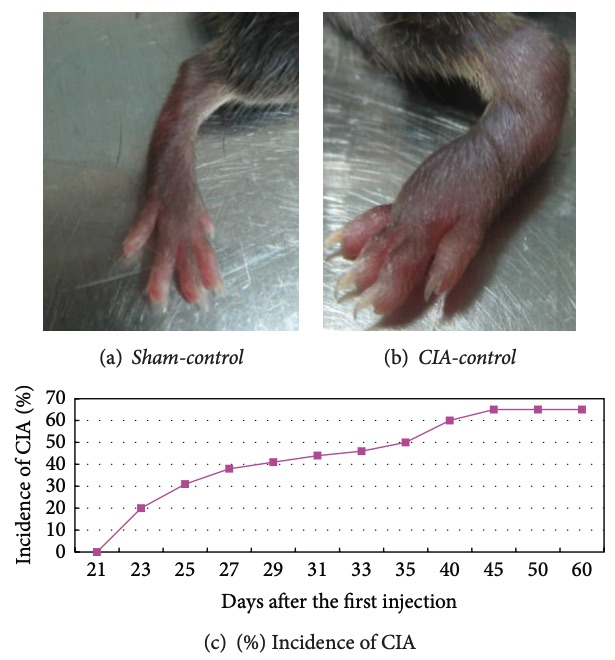Collagen induced Arthritis (CIA) Modeling & Pharmacodynamics Service
Creative Biolabs is dedicated to delivering the highest quality models and related services. Our staff are highly specialized and will work closely with you from the selection of proper models, study plan design to final data analysis and reporting. For rheumatoid arthritis studies, we provide CIA, AIA, and CAIA models.
Features of Collagen Induced Arthritis (CIA) Model
Rheumatoid arthritis (RA) is a typical, chronic autoimmune disease that primarily affects the joints, ultimately leading to synovitis that often develops into cartilage and bone erosion, apart from which, extra-articular features are presented, including subcutaneous nodules, vasculitis, and pulmonary fibrosis, particularly in severer cases. Of the various animal models of rheumatoid arthritis (RA), collagen induced arthritis (CIA) is the most widely studied and used standard model, largely on the basis of the preclinical, pathological and immunological similarities between CIA and RA. Creative Biolabs offers CIA models elicited in genetically susceptible strains of both rats and mice by immunization with heterologous (usually bovine, chick, or rat) or autologous type II collagen emulsified in the adjuvant, resulting in different forms of arthritis (acute or protracted).
 Fig. 1 The CIA model, clinical symptoms, and time course. 1
Fig. 1 The CIA model, clinical symptoms, and time course. 1
The pathological features CIA model shared with RA include a proliferative synovitis with infiltration of polymorphonuclear and mononuclear cells, cartilage destruction, bone resorption, pannus formation and fibrosis. Additionally, susceptibility to both CIA and RA is linked with genes encoding MHC class II molecules, which indicates the role of CD4+ T cells in these two diseases. What's more, similar to RA in humans, CIA models abundantly express proinflammatory cytokines, involving tumor necrosis factor (TNFα) and interleukin (IL)-1β.
Creative Biolabs is capable of offering various assessments, including but not limited to:
- Evaluation of inflammation swelling
- Clinical scoring of arthritis
- Body weight measurement
- Histopathological examination
- Cytokine profiling
- Collagen antibody levels
- Flow cytometric analysis of the inflammatory cells
Application of Collagen Induced Arthritis (CIA) Model
The CIA model has been applied to elucidate underlying pathogenic mechanisms of rheumatoid arthritis disease, involving the role of individual cell types in disease onset and progression, as well as to design and test new therapeutics. Recently, the CIA model has played an important role in the testing and development of the new biologically based therapeutics, such as those that target TNFα, a cytokine produced by macrophages and T cells and is a dominant inflammatory mediator in the pathogenesis of RA.
Meanwhile, in order to meet our customers' specific requirements and their various research objectives, Creative Biolabs also offers other rodent inflammatory & immunological disease models listed as follows that you may be interested in:
- Carrageenan Air Pouch Model
- Carrageenan-Induced Paw Edema Model
- Imiquimod (IMQ)-Induced Psoriasis Rodent Model
- Chemical-Induced Rodent Contact Hypersensitivity Model
- Passive Cutaneous Anaphylaxis (PCA) Model
- Delayed Type Hypersensitivity (DTH) Rodent Model
- Adjuvant-Induced Arthritis (AIA) Rodent Model
- Collagen Antibody-Induced Arthritis (CAIA) Model
- Cecum Ligation and Puncture (CLP)-Induced Sepsis Model
- LPS-Induced Rodent Sepsis Model
- Spontaneous Systemic Lupus Erythematosus (SLE) Mouse Models
- Induced Models of Systemic Lupus Erythematosus
With years of experience, our scientists understand that the right research models give you the foundation for consistent study data. At Creative Biolabs, you will find pleasing services of designing, conducting and analyzing animal efficacy studies for your drug candidates. Contact us to get your project underway.
Reference
- Li, Qi-Hui et al. "Adenosine A2A Receptors Mediate Anti-Inflammatory Effects of Electroacupuncture on Synovitis in Mice with Collagen-Induced Arthritis." Evidence-based complementary and alternative medicine: eCAM vol. 2015 (2015): 809560. doi:10.1155/2015/809560.
For Research Use Only.
